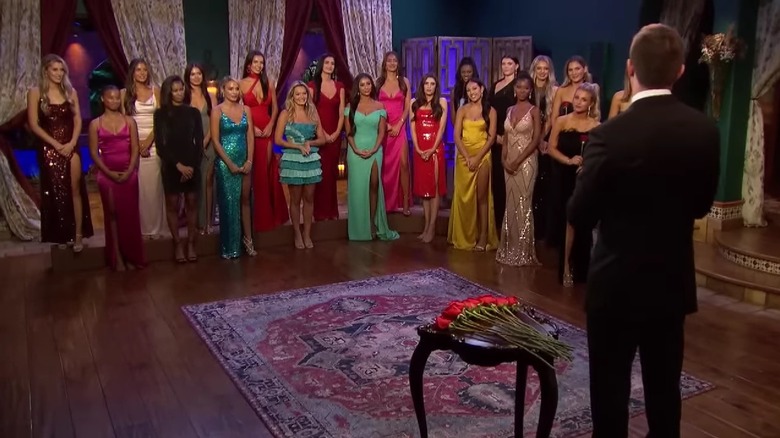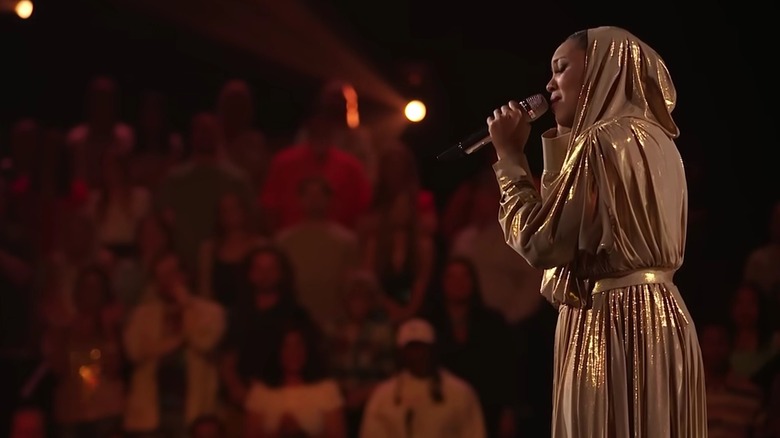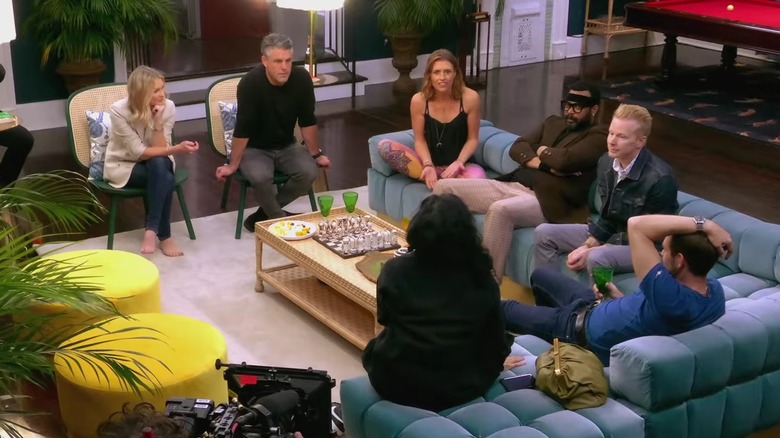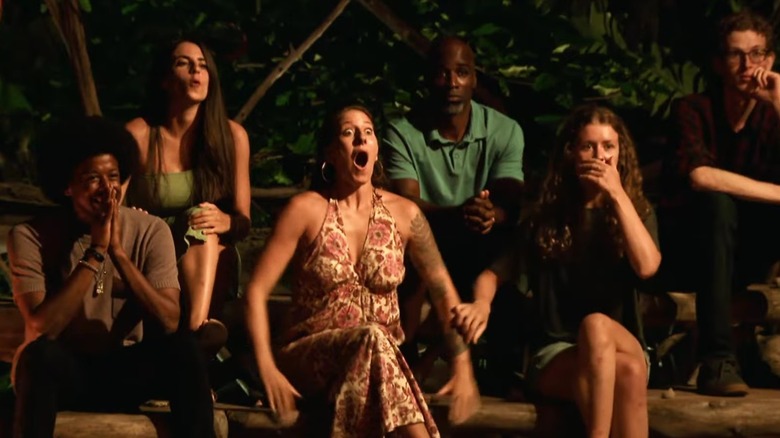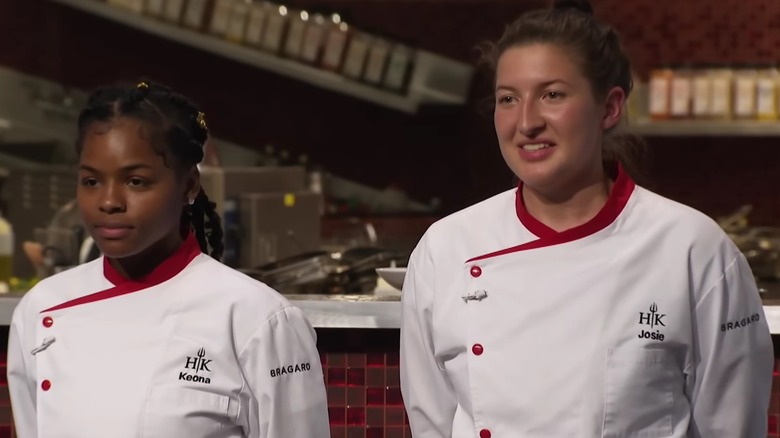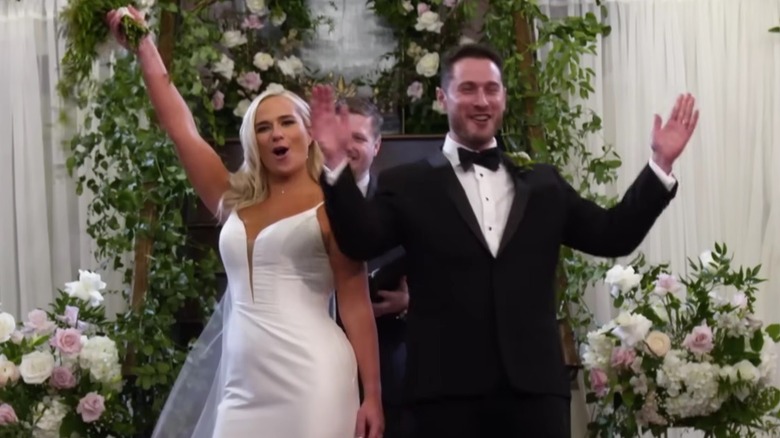Strange Rules Reality TV Stars Have To Follow
If you're one of the seemingly numerous ordinary folks who aspire to be a reality TV star, despite the countless disturbing things that can happen on reality shows, you may be under the impression that the experience might at least superficially resemble actual reality. It might be, you probably think, something like a job — you show up, stay in a house or on some island with a bunch of strangers for a while, do stuff for the cameras, and retire to your quarters at night. And while the cameras are rolling, you just ... act natural, right? Not quite, at least when you factor in the behind-the-scenes rules the stars are given.
As it turns out, reality shows are sometimes even more carefully scripted than scripted shows, because any producer worth their salt knows that in real reality, people are usually pretty boring. As such, reality TV productions can be subject to surprisingly tight standards and controls — and the people who appear on them can be bound by rules that one might find to be absurd, draconian, or just plain strange. Here are a few of them — and remember, it's all in service of bringing you the finest mind-numbing, cheesy, often trashy entertainment that the small screen has to offer.
The Bachelor and Bachelorette undergo a bevy of tests
For over two decades, "The Bachelor" and "The Bachelorette" have been the gold standard of reality dating shows — promising viewers that fairy-tale romances just might still exist. As one might imagine, the stress of competing for the hand of the series' prize single in the national spotlight is considerable — and yes, contestants on both shows undergo an extensive screening process. Quite a bit more extensive, in fact, than one might think.
According to a blog post by a male hopeful who came within a hair of competing on "The Bachelorette," a key part of the casting process involves a psychological evaluation that consists of a whopping 600 questions, give or take. It doesn't end there, as potential contestants then have to run a gauntlet of criminal background checks, blood and urine tests, and a series of meetings with the production crew intended to gauge how you will come off on camera if selected.
The entire stressful process will hopefully culminate in landing one of the more stressful gigs in reality TV. In a piece for AZ Central, several of both series' past competitors — including the 26th "Bachelor" himself, Clayton Echard — described their time on the show as detrimental in the extreme to their mental health. Said Echard, "[With] Everything that I went through on the show, like, I could still be in a corner right now crying and no one would blame me."
Chopped contestants bring their own knives and a compelling backstory
Among the ranks of cooking competitions, Food Network's "Chopped" may stand as the one that takes the most pure gumption in order to emerge victorious. Virtually all of its contestants have some kind of professional cooking experience, but the show's challenges — in which competitors must create something edible from "mystery baskets" of seemingly randomly assembled, often bizarre ingredients — are enough to test the mettle of even the most seasoned chefs.
In 2015, former contestant Josh Lewis, who made it as far as the final round, spoke to The A.V. Club about his experience, and he revealed a couple of odd requirements for selection. For one, it helps for potential contestants to have some kind of personal angle that they can play up for a bit of drama. Lewis, for example, had anxiety, and when he was being considered for the show, he said that this "was kind of my story, that I was there to overcome my anxiety."
Perhaps most strangely, though, the producers supplied absolutely everything the contestants might need — except for knives, which the chefs were encouraged to bring themselves. Finally, contestants are fed not by a stable of Food Network chefs, but by an off-site catering company — and how, you might be wondering, is the grub on a Food Network production? "Not good, actually," Lewis said. "We were all shocked. No one ate much of it."
No politicians allowed on American Idol
American Idol is more or less the OG singing competition, reality TV's premier venue for vocalists to punch their golden ticket to the big time. Superstars like Kelly Clarkson, Carrie Underwood, and Jennifer Hudson all got their start on the show, and although the competition is stiff and the rules are stringent, those that emerge victorious — or even come pretty close — can receive an enormous boost to their careers.
Among those ever-so-stringent rules is American Idol's strict age range requirement, with those past the ripe old age of 28 not being allowed to compete. Contestants must also not be under any kind of contract in the entertainment business, and if you have made it to the "Idol" top ten in a previous season, you are not allowed to return. Oh, and no politicians.
That's right: to be a politician actively seeking or holding public office is one of only two totally disqualifying lines of work for an "American Idol" contestant, the other being an employee of 19 Companies — the company that produces the show. Of course, once your "Idol" experience is over, you can run to your heart's content — like Season 2 runner-up Clay Aiken, who is one of a number of celebrities who've run for public office. But if you want to represent the people as their American Idol, you can't do it as an actual, elected representative. Or senator. Or president.
Spartan conditions on Love is Blind
The Netflix reality show "Love is Blind" has, for six seasons and counting, enticed viewers with an interesting premise: could you fall in love with someone, and possibly even marry them, without ever actually getting to see them? On the series, contestants are allowed to "date" fellow contestants by way of interacting in separated "pods," in which they can chat the night away if they so desire — they just can't interact physically in any way, including via their eyeballs. Now, those pods sure look cozy, and the guys and girls can mingle among contestants of their own gender in a plush common area — but at lights-out time, the situation is just a bit different.
During the experience, contestants are completely shut off from the world — that means no phones or Wi-Fi, and it doesn't change once they're retired for the evening. Nope, all they have to do as they attempt to drift off to sleep is to ruminate on the appalling conditions of their sleeping quarters. As former contestant Kenny Barnes put it to Refinery 29: "We slept in trailers ... [on] correctional facility beds. The design was to just strip us down from our comfort level."
In addition, filming took place for up to 20 hours a day, meaning that the amount of shut-eye contestants actually managed to achieve in those conditions was kept to a minimum. If you've ever wondered why contestants on the show sometimes make confounding decisions, well ... there you go.
Too Hot to Handle cast can't get too drunk to handle it
Perhaps the trashiest, most borderline-offensive reality TV shows out there, the Netflix dating series "Too Hot to Handle" gives us stupidly good-looking contestants dating and trying to make connections while finding ways to keep their hands — and other parts — off each other. Not even kissing is allowed, and for each "rule break," they are docked cash out of a communal pot that starts at a whopping $100,000. This pot, of course, tends to dwindle steadily as contestants repeatedly and often flagrantly break the rules — in fact, the entire pot would likely be gone overnight but for one of the conditions by which they must abide.
While contestants on the show are allowed to drink alcohol, they are only allowed to do so in moderation — that is, no more than two drinks per person, per night, and the drinks are actually handed out by the show's producers to avoid the possibility of anyone over-imbibing at any time. Probably a wise move in a series where the only way to have any measure of success is to keep your inhibitions in check.
Perfect Match gets pretty boring
Netflix's "Perfect Match" is yet another "sexy singles all share a house and date each other" type deal, with contestants matching up at the end of each night and competing in "compatibility challenges" every day. The catch is that, as they attempt to form serious, long-lasting connections, more sexy singles are continually brought in to finagle their way into the house by screwing up those connections. Contestants that find themselves matchless at the end of the night must vamoose, but they are often among those selected to return at a later point in the series — and for those temporarily expelled poor souls, their "Perfect Match" experience suddenly gets way, way less exciting.
Speaking with the Zachary Reality podcast, Season 1's lovable goofball Bartise Bowden has revealed that in between their stints in the house, contestants are sequestered in hotel rooms with literally nothing to do. They're all by themselves, they're not allowed to communicate with the rest of the cast, and they are allowed only a half hour of phone time every day — and even that is monitored by producers to make sure they don't compromise the integrity of the game.
Bowden also revealed that while he only appeared on the show for about half the season, he spent a ridiculous five weeks on location — meaning that for a whole lot of that time, he was posted up in a nondescript room, perhaps watching reruns of more successful shows like "Big Bang Theory."
Real World participants literally sign their lives away
For better and worse, MTV's "The Real World" pretty much gave birth to the entire reality TV genre, and its simple "strangers live together in a house" premise has been swiped and put through endless permutations since the show's debut back in 1992. It stands to reason that participants would experience a pretty severe disruption to their normal lives while appearing on the show, but the truth may be that once you agree to appear on "The Real World," MTV pretty much owns you — and might not be an exaggeration.
According to a cop of the show's contract supposedly acquired by The Village Voice in 2011, potential participants agree that MTV is not liable if they are publicly humiliated or "portrayed in a false light," and that's just the tip of the shady iceberg. Real Worlders also must agree that they might catch an STD (although they must be screened for them), lose a limb, be subject to "non-consensual physical contact," or even die.
Believe it or not, that's not all. The alleged contract states that the stars are not allowed to change their appearance, go anywhere that MTV is not permitted to film, or get pregnant. MTV is granted access to their email, employment and credit history, and other normally private accounts and documentation, and producers are given "blanket rights to your life story," including the right to misrepresent any portion of it. A small price to pay for reality show infamy, though, right?
Love Island contestants exist in a timeless void
"Love Island" is another "couple up or be eliminated while navigating a constantly updated bevy of sexy singles" series. The difference? This one takes place on an island. Well, in a villa on an island. The "Islanders" also face all kinds of weird challenges, as well as the whims of the public, who can vote via a smartphone app for their favorite couples to stay, or for their least favorite to go. General rules are few, but there is one that is more than a little weird; actually, it's really not so much a rule as a state of being totally removed from the flow of time.
That is to say that while there are clocks in the villa, they are all wrong, and contestants have no smartphones or watches; nobody participating in the series ever has any idea what time it is. Former contestant Michael Griffiths, who appeared on the series in 2019, told GQ that he and some fellow Islanders went so far as to attempt to make a sundial during their stay. "We still couldn't figure out [what time it was]," he deadpanned.
The background check for MasterChef is ... different
The long-running cooking competition "MasterChef" is the gold standard of amateur cook-offs, and the U.S.A. version can be a bit on the intense side. After all, it involves yell-master Gordon Ramsay — a celebrity chef with their own tragic backstory. Therefore contestants are screened to ensure that they theoretically should hold up under the pressure. They are also, apparently, screened to make sure that they're not living under an assumed identity, or on the run from Interpol, or Jason Bourne. In an article for Salon, former contestant Jessie Glenn revealed that the show's background check is more like a background deep cavity search.
After taking a two-hour psych test and being grilled by a mental health examiner over its results, potential contestants are told to meet with an actual private investigator, who bombards them with bizarre and invasive questions. "No, I never modeled underwear for softcore porn," wrote Glenn. "I'm sure I did many worse things he didn't ask about, though, and I sweated guilt." After the interrogation, the investigator ordered every report imaginable (credit, residential, employment, criminal, and more) on Glenn, who was in the end sent home.
No twinsies on Survivor
One of the longest-running reality series, CBS's seemingly very real-looking "Survivor" pits contestants against each other in far-slung, remote locations, where they participate in survival-based challenges, form alliances and make enemies, and vote each other off until only one is left standing. The format is an absolute drama machine, and as one might imagine, there are all sorts of rules and requirements in place to make sure that contestants are relatively safe, psychologically prepared, and not physically in over their heads. This is all completely understandable, but there is one little rule that has nothing to do with safety or stress levels, and everything to do with the "TV" part of the reality TV equation.
Speaking with People, host Jeff Probst confirmed that the contestants' wardrobes are carefully vetted by the producers before filming, and not just to avoid revealing garments or pesky, unlicensed brand names. Not only must participants' clothing give viewers a sense of their personalities, but nobody is allowed to wear the same color shirt — making it easier, of course, for viewers to tell them apart in the early going when the field is crowded. Probst revealed that there is sometimes a bit of pushback from contestants, but sensibly pointed out that "If the color of your shirt is that important, you're probably not ready for the jungle."
Hell's Kitchen is a lot like actual hell
Fox network's "Hell's Kitchen" is the ultimate glutton-for-punishment cooking competition in which professional chefs compete for a prestigious job, while facing ridiculously demanding culinary challenges and getting constantly yelled at by Gordon Ramsay. Cooking at the professional level is stressful enough even without the competitive and Ramsay-yelling elements thrown in, but those aren't the only ways in which the series lives up to its title.
The contestants are followed during down times as well as during competition, and they must agree to be on camera and mic'd up at all times — and that really does mean all times, including when they are sleeping, going to the bathroom, and other such typically ultra-private moments. In a roundtable conversation of former contestants hosted by The Record, Chef Dana Cohen shared that competitors simply grow accustomed to a complete lack of control over their lives, accompanied by near-total scrutiny. "You never have your phone. You're wearing a microphone 24 hours a day," he said. "You fall asleep and then someone goes up your shirt to change your batteries ... [the cameras are] always on you." The only way to escape their roving gaze, he said, was to burst into song — a copywritten song, one which Fox would not want to pony up cash to license.
Married at First Sight only foots so much of the bill
Lifetime's "Married at First Sight" is exactly what it sounds like: A crack team of relationship experts select a few couples every season not to go on a blind date, but to get, well, blind married. The show then follows them as they try to navigate their brand new maybe-lifetime commitments, concluding with "Decision Day," on which the couples must decide whether to remain married or call it quits.
Now, the marriages on the show are indeed legal and binding, and yes, the couples sign prenuptial agreements before they take place. But, you may be asking, does the show pay for the ceremonies? Yes, it does, although the lavish weddings featured on the series are just for the cameras. The real ceremonies are simple civil affairs, which producers foot the bill for, but what about the couples who get divorced? Does the show pay for those? And the answer is ... not really.
Speaking with The Wrap in 2014, executive producer Chris Coelen shared that the production does not set aside funds for the inevitable, despite divorces being notorious for getting very expensive. "We will contribute within a certain period of time if they get divorced," he said. "We will help them cover the costs of an attorney if they choose to do that. I don't know what the amount is. It's nominal."

